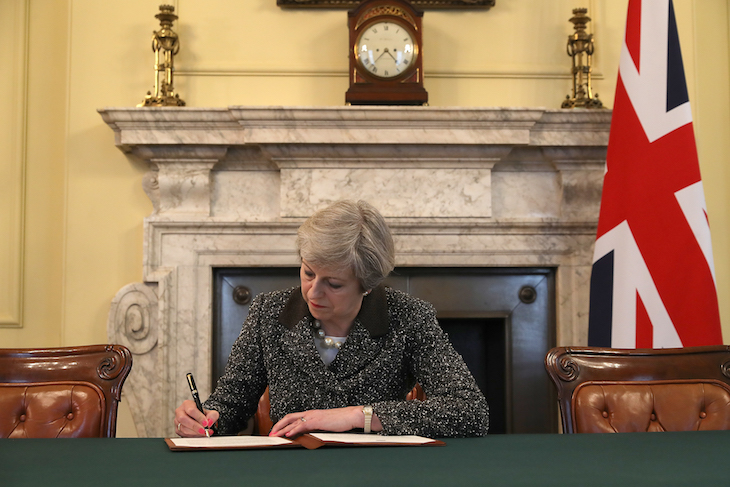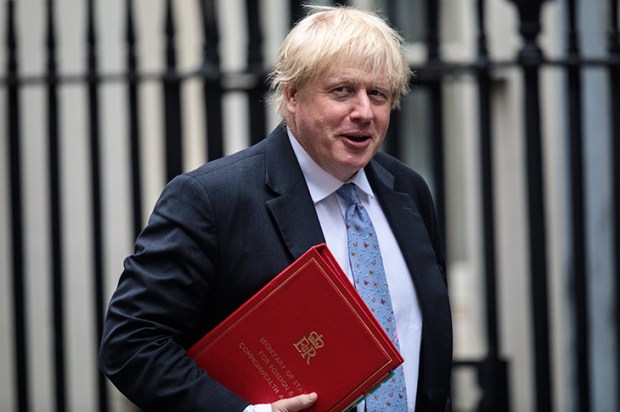Theresa May has made it to the summer. In the aftermath of the election, Downing Street’s immediate aim was to get the Prime Minister to the parliamentary recess. On Thursday they succeeded. They think that the next six weeks will give the government a much-needed chance to regroup and catch its breath. Like a cricket team playing for the close, they hope conditions will be more favourable when proceedings resume. But is there any reason to think that things will be different in September? The summer break can do many things but it can’t conjure up another 20 Tory MPs or put time on the Brexit clock.
Tory optimists claim things will be better once everyone has had a lie down. The theory goes that the resentments caused by the way ministers were treated during Theresa May’s first year in office, the woeful general election campaign and the personal animosities that have developed in cabinet in the past few years have collided with the Westminster summer party season, leading to an outbreak of leaking. They think tempers will be less frayed when every-one returns in September, refreshed and adjusted to the change in the political weather.
The counter-argument is that the conference season starts soon after parliament returns. Party conference makes the Westminster summer circuit look like a mindfulness festival. Even in the best of times, it leads to lots of stories that cause problems for the leadership. This year will be particularly fraught because it will be the first gathering of the Tory tribe since the election went so badly wrong. Without extreme care, it will turn into a disorganised beauty parade of leadership contenders.
Ministers fear it will be impossible to say anything without it being seen as a leadership pitch – even if they don’t intend it that way. Meanwhile, backbench MPs already seething at the behaviour of the party’s top brass will not react kindly to anyone who looks like they are using conference to advance their own ambitions.
One possible way to avoid conference spinning out of control would be for Theresa May to outline a timetable for her departure before it starts. No one thinks she will lead the Tories into the next election, so saying she will go after the Brexit deal is done would not undermine her authority any more that it has already been undercut by the election result. But it would shift the burden of proof on to those who want her to go sooner. The acknowledgement that there would be a contest would also make it easier to handle the leadership question. Every comment on the fringe or address from the conference stage wouldn’t be seen as a challenge to May but rather as part of a debate about the party’s future.
While the Tory conference is a nuisance to the government, Labour’s offers the party some hope that things might get better. Its fragile post-election unity is largely holding for now, with moderates keeping their heads down and their concerns to themselves. But if the conference makes it clear that the Corbynites won’t stop until they have deselected their internal opponents, then things will start to look very different. You might have thirty-odd Labour MPs who think they have nothing to lose and so become impossible to whip.
Any purge of the moderates would also reopen the debate about forming a new party. If there is no space for them in Labour, they may choose to set up camp elsewhere. If they do, they certainly won’t lack financial backing. Labour figures in the corporate world are adamant that the money for a new party could be raised with extreme ease.
If Labour is prepared simply to sit back and not say much, then this government would likely lose the next election. Yet the nature of Corbyn’s supporters means that they won’t ever be passive. Instead, they will want to cement their control over the party, to make Labour’s turn to the left as close to irreversible as possible. This might break apart the internal coalition and such a split would, obviously, ease the pressure on the government. It would also remind Tories that this is not a rerun of 1992-97 and that defeat is not inevitable. This would help calm some of them down.
The other great Tory hope is the sheer volatility of politics in 2017; the wheel could turn again. Both Nicola Sturgeon and Theresa May were preposterously popular before crashing to earth. Why they struck such a chord with the public in the first place is worth reflecting on. In both cases, what the public seemed to like was that they didn’t seem to be typical products of contemporary politics. (Ironically, they both are; they have no great outside experience, very political spouses and few other interests.) Their initial popularity suggests an eagerness to embrace something different from the current ruling class, even the public don’t quite know what that is yet.
This is what the Tory party should be reflecting on this summer. It needs a ‘what’ as much as a ‘who’; an agenda that chimes with what the country wants. For all that Brexit dominates the current scene, it will not be such an all-consuming issue at the next election. The negotiations will be over and done and, barring yet another political surprise, the transition period will, at the very least, be drawing to a close. In these circumstances, what will be needed is a proper economic and political vision for the future. This vision will not only have to offer an account of how Britain will earn its way in the world outside of the EU, but also address current problems such as low productivity and the broken property market.
At the last election, the Tories turned Brexit into a process story, with disastrous results. Canvassers say many voters couldn’t understand why they were banging on about an issue that they thought had been settled by the referendum. This will be even more true next time around. If the Tories are to come through this period, it will be because they have crafted an agenda that speaks to the country’s long-term needs. This is what they should spend their summer working on.
Got something to add? Join the discussion and comment below.
Get 10 issues for just $10
Subscribe to The Spectator Australia today for the next 10 magazine issues, plus full online access, for just $10.
You might disagree with half of it, but you’ll enjoy reading all of it. Try your first month for free, then just $2 a week for the remainder of your first year.















Comments
Don't miss out
Join the conversation with other Spectator Australia readers. Subscribe to leave a comment.
SUBSCRIBEAlready a subscriber? Log in